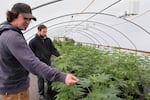
Mowgli Holmes' startup, Phylos Bioscience, will outline the genetic profile of any cannabis plant a customer wants.
Kristian Foden-Vencil / OPB
Imagine you’re starting your own marijuana farm.
First you get land and water rights. Then you’ve got to find the right strain of cannabis. That can involve as much luck as science.
“There’s a lot of legend and laws," said Mowgli Holmes, the chief scientific officer at Phylos Bioscience.
"In general it’s like, 'My friend Billy gave me this. And he told me that he got it from this guy. And ... this is the original thing. This is the lost cut of Panama Red from so and so in 1978.'”
Phylos Bioscience is an Oregon startup that, for a few hundred dollars, will outline the genetic profile of any cannabis plant you bring them.
The information is great for growers — it helps farmers ensure they're not going to get sued for infringing on someone else's intellectual property.
Growers need that kind of detail, because the cannabis market is a mess. Holmes said medical consumers, for example, can’t be assured the strain they buy one week will be the same next week.
“They find something and it’s called ‘Lemon Haze’ or whatever. But then they can’t get it again. They go back and they get something called the same thing, but it’s not the same thing," he said. "And they can’t get the same thing anywhere else even though it has the same name because people just rename things, because they don’t know what they are."
Phylos is only one of dozens of Oregon startups doing research on marijuana.
"The numbers we just received by phone says in the last six months there’s $60 million to $80 million that has gone into startups,” said State Sen. Floyd Prozanski, D-Eugene, who sits on Oregon's medical regulation committee.
There are all kinds of different businesses. Some are trying to perfect the process of extracting cannabis oil. Some are developing a dermal patch — so people can absorb marijuana through their skin. This January, a group of entrepreneurs launched the "Oregon Hub," a farm and research center in Clackamas County that aims to improve growing techniques by finding ways, for example, to reduce water and energy use.

Seth Crawford of Oregon CBD is breeding plants to grow in different climates.
Kristian Foden-Vencil / OPB
Seth Crawford and his brother run "Oregon CBD" in the Willamette Valley. They’re working with industrial hemp, which is federally legal as long as it contains less than 0.3 percent of the active cannabis ingredient, THC.
Their goal is to invigorate America’s old industrial hemp market by breeding plants to grow in a variety of climates.
“You're looking at humidity, mold and mildew resistance, a number of different types of potential pathogens that emerge in specific micro-climates that we try to adapt our plants for,” he said.
So there is plenty of marijuana research going on in Oregon. But it’s startup research — not the kind of peer-reviewed, double-blind research that’s going to lead to FDA-approved medications. Thus, the benefits for patients are less direct.
Most FDA-level marijuana science is being conducted overseas. A British company recently developed a cannabis extract called Sativex. It’s been approved for to help with neuropathic pain in 28 countries — but not the U.S.
The FDA has also approved another drug called Marinol to treat nausea in cancer patients. It’s made out of synthetic THC, the compound in marijuana that gets you high.
But marijuana contains a hundred compounds or more, and experts say it’s the interaction between those compounds that give the plant its medical properties.
The FDA’s drug approval process doesn’t deal with so many compounds at one time.
So perhaps the future of Oregon’s medical marijuana market will be in the form of supplements and "whole plant" edibles, rather than new FDA-approved medications.
